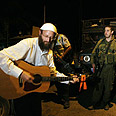
Orange is the summer's most fashionable color
צילום: צפריר אביוב
Color war
Battle between pullout objectors adds hues to summer’s grayness
Anyone traveling the country’s roads these days knows that in the battle between orange, associated with the anti-pullout camp, and blue, associated with the pro-pullout camp, orange wins in a knockout.
It wins not only in religious strongholds such as Jerusalem, Bet Shemesh or Bnei Brak, but also in Haifa and Tel Aviv. It wins not only on weekdays, when all Israelis flood the roads, but also on Saturday, when the cars of the religious take a timeout.
The battle of the ribbons is a blessed phenomenon. It insets a little color into the summer’s grayness. Mostly, it passes the argument about the disengagement to a friction-free, violence-free arena, where I’m in my world and you’re in yours, and we both can stand together at a traffic light.
(Perhaps this is an opportunity to create stereotypes; the “Blues” I’ve spoken to are convinced the “Oranges” are wild drivers who disregard traffic laws; they are also bullies who sabotage cars that bear ribbons they dislike. Meanwhile, every “Orange” I’ve spoken to is convinced the cars of the “Blues” are newer and fancier - cars of the rich.)
Two lobbies have assumed the task of dealing with the “Orange” leadership: The People’s Choice Israeli-Palestinian civilian peace initiative, which distributes blue and white ribbons and Peace Now, which hands blue ribbons.
Blue costs more
Peace Now Secretary-General Yariv Oppenheimer admits his ribbons are falling behind. He says the “Oranges” have distributed more than 1 million ribbons to date, while he has distributed less than half a million. According to his calculation, only 20 percent of the ribbons handed out find their way to car antennas.
The result is that fewer than 100,000 vehicles are adorned with blue ribbons.
“We got started late. We encountered difficulties finding a manufacturer who charges a price (20 agorot, or approximately 5 cents, per ribbon) we could handle. Meanwhile, the ‘Oranges’ are registering an overwhelming victory,” he says.
The gap is not only logistical. It’s genuine. According to polls, most Israelis support disengagement. However, this support is indifferent, shallow, half-hearted, a sort of support from afar, without any emotional involvement.
Opposition to the disengagement, however, is an entirely different matter. It comes with a statement. It features defiance. It possesses sex appeal.
My gut feeling, I told one of the pullout-backing Likud ministers, is that had Sharon submitted his move to a national referendum, he would have lost.
Am I right? To my surprise, I received a skeptical, hesitant reply. It is very possible that the girls with the tears and braids, who convinced Likud Party members not to uproot them from their homes, would have managed to convince, using the same tactics, a large part of the general voting public.
Left-wing voters may have traveled abroad and Arab-Israelis may have stayed at home. The country may been awash with political violence.
Democratic decision
What’s certain is that Sharon acted wisely by refusing to submit the question to a test.
If that’s how pullout backers feel, it’s easy to guess what the plan’s objectors are feeling.
Last week, I sat down with a group of settlers in Ganei Tal, an agricultural settlement at the heart of Gush Katif. With immense pain they asked where democracy is. I wanted to reply with former Prime Minister David Ben-Gurion’s famous saying: “I don’t know what the people want; I know what’s good for the people.”
However, I immediately changed my mind. Such talk was also heard from Saddam Hussein.
I said that decisions in a democratic state must be taken by an elected leadership acting by law, not through polls and not through referendums. That is the case in most Western democracies: the majority sits on the fence, whines about its leaders, and allows them to decide for it.
As expected, they weren’t convinced.
As to the war between blue and orange, it’s still going.
Peace Now’s Secretary-General, for example, is convinced once the settlers start resisting soldiers by force the country would be filled with blue. Every threat by far right heroes gathered at the Gush Katif hotel, every road blocked by the boys in orange only boost the demand for the blue ribbons.
“We’re still in the ‘coming soon to a theater near you’ stage,” he said. “The movie hasn’t started yet.
Nahum Barnea is a columnist for Israel's leading newspaper, 'Yedioth Ahronoth'










